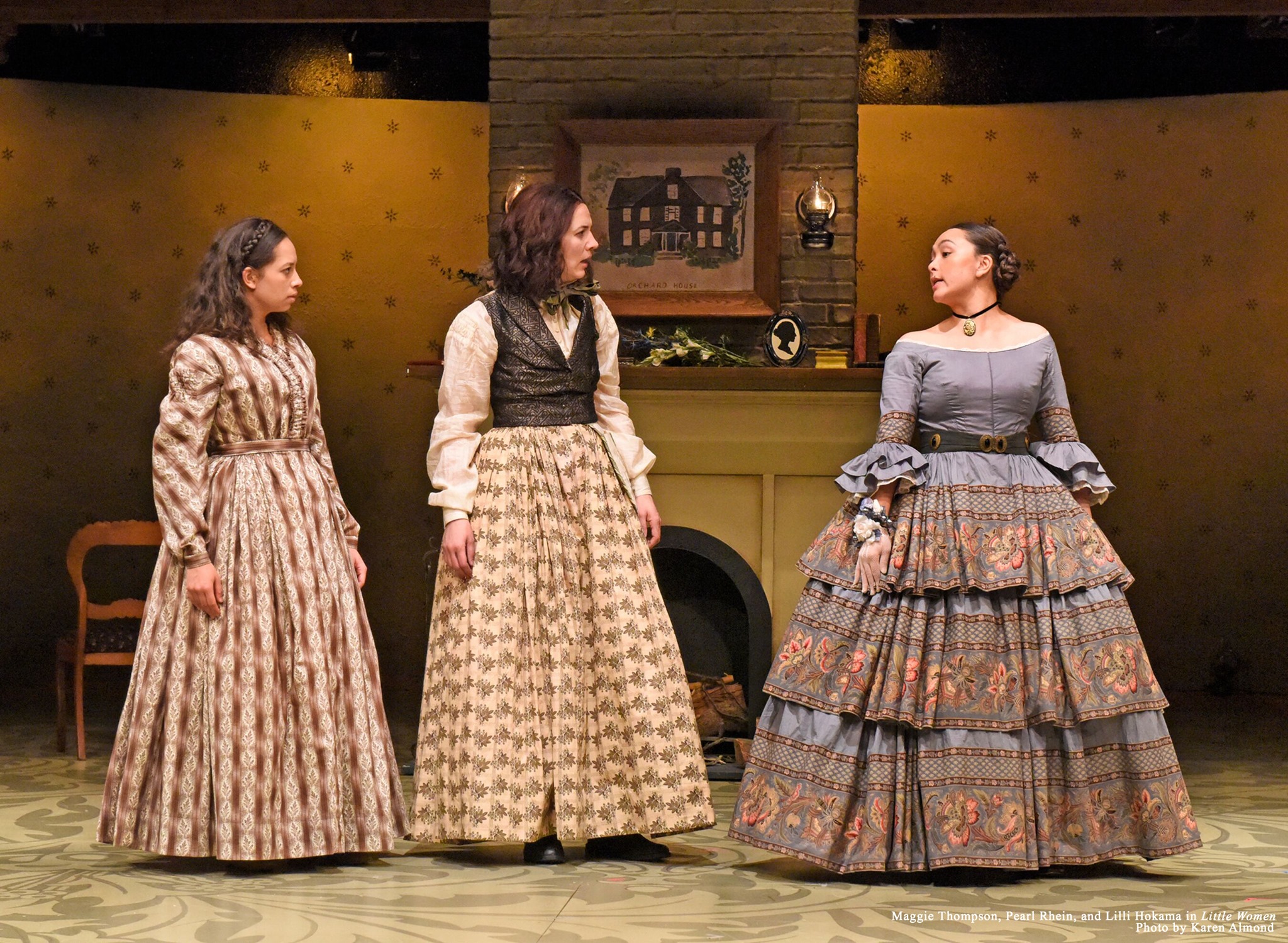Old-souled Jo grapples with gender dysphoria. Young Beth manages high functioning autism. The oldest, Meg, is vain; the youngest, Amy, proud. If postmodernity accomplishes nothing else, at least we’ve diagnosed the March sisters, the protagonists of Louisa May Alcott’s 19th century novel Little Women—a story about the difficulty of discovering and growing into one’s own mature identity.
Gladly, Kate Hamill’s 2018 theatrical adaptation of Little Women avoids labeling, relying instead upon an unrelenting pace, diverse casting, and a lush, quotable script to portray the March sisters’ deeply personal – and infinitely relatable – struggles with self and society. As an artwork, the play is timeless. As an adaptation of Alcott’s novel, it misses the mark.
Little Women is now playing at Dallas Theater Center until March 1. Bringing Hamill’s vision to life is a vibrant, youthful cast directed by Sarah Rasmussen, who also directed the show’s premiere in Minneapolis. Lilli Hokama, in the role of Amy, steals the show. Querulously shrill and gazing moony-eyed at the boys, Hokama flirts, flounces, sasses, and simpers her way to an utterly exasperating yet most endearing Amy. Likewise, Pearl Rhein pegs Jo, a rough-and-tumble writer who doesn’t want anyone or anything to change, much less grow up. Rhein captures the spirit of this gawky and gangling girl who doesn’t even want to be a girl.
Hamill skillfully compresses the vignettes of Alcott’s novel into a smooth-segueing plot. Scenes fly by like telephone poles out of a train window, at a pace that should be unbearable but isn’t. For Little Women’s dizzying pace conveys to the audience the dizzying speed at which the March girls feel themselves growing up. It’s an artistic tour de force reinforced by a spinning stage symbolizing time’s passage
The first act brims with calamity, forcing Meg (Jennie Greenberry) to sigh, “We’re all too young for this.” She speaks for all of us. The characters are so compelling, we can’t not emotionally invest in the March family. The sibling dynamics are especially well rendered: reformist Jo and conservative Amy never cease dueling; shy Beth (Maggie Thompson) cuddles with Jo for stories; socialite Amy turns to Meg for support and style; and Meg, like any older sister worth her salt, bosses everyone else around.
Unfortunately, Mike Sears, in the role Mr. Laurence, misrepresents the kind old man–he’s grouchy where he should be gruff. Similarly, Laurie, played by Louis Reyes McWilliams, is an awkward boy rather than the careless-and-free indolent he ought to be (although the antics between best friends Jo and Laurie are perfectly jovial and rowdy). Both characters and actors fall into place, however: Mr. Laurence softens, Laurie gains grace.
It’s in the second act that Little Women fails as an adaptation. Without giving too much away, a marriage important in the novel is missing from the play (I’m not talking about Jo’s). In the marriage’s place, we get a frustrated Jo considering quitting writing in order to “grow up.” Beth counsels her to not do so, for that were “giving up, not growing up.” Those are profound words that ring hollow without the marriage. In the novel, the marriage suggests that heeding social mores can bring happiness, while, on the other hand, Jo suggests that disregarding social mores can also bring happiness. Hamill’s Little Women, without that balance, implies that countercultural egoism is the only way to be human. But following rules and living authentically are not mutually exclusive. There are many ways to be mature.
That’s essentially what Little Women is about, the timeless struggle to define and reach maturity. A particular scene adumbrates this battle. Meg, now wife and mother, bursts into the March house covered in raspberry jam. Weeping inconsolably, she bares her burden to Jo: The twins are teething and won’t stop wailing. The girl has the cholic and isn’t sleeping. The chores are unending. Her husband is always absent working. Today, miraculously, the twins napped simultaneously. Meg, overcome with relief, gobbled a jar of raspberry jam—at which moment the twins awoke. They began wailing. Meg began wailing. John returned home to find his wife wailing in the kitchen, his children wailing in the bedroom, and no dinner. He lost his temper, and Meg promptly ran home to become a child again.
Jo, delighted, encourages Meg to ditch John, who at that moment enters the room and begs Meg to forgive his stiff and stuffy demeanor (proving that there’s at least one good apple amidst the putridity of the cis-white-hetero patriarchy barrel). Meg forgives John and returns home with him, leaving Jo desolate. “Nothing lasts forever,” as Beth tells Jo. Especially childhood.
After the jam scene, there follow marriage proposals and proposals rejected. Sororal bonding and sibling discord. War and peace, all in a day’s work, as any sibling knows. Everyone accuses everyone else of always getting what they want and gripes about never getting what they want, until you realize that no one gets what they want. Through it all, Meg’s line rings in our ears: “We’re all too young for this.” Oddly pessimistic for a story about growing up and maturation. But it’s a sentiment that never seems to go away—either in real life or in the play.





